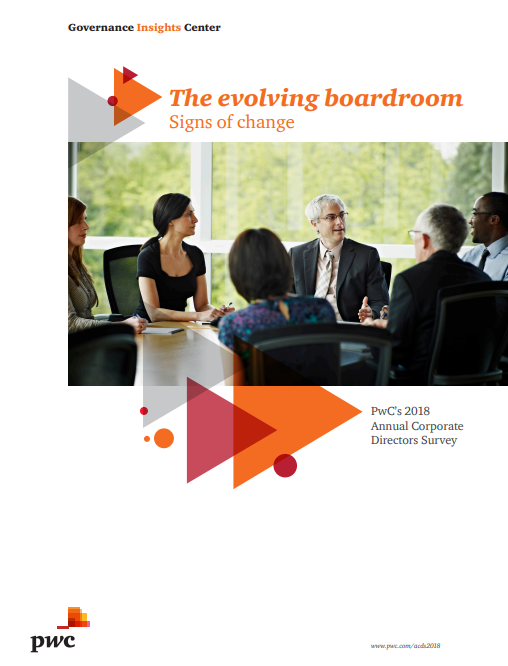No calendar year is complete without a deep dive into the results of PwC’s Annual Corporate Directors Survey. Each year, we comb the survey results from 700+ corporate directors to understand current trends, perspectives, and priorities in today’s boardrooms. To examine these survey results in a vacuum, however, would be a missed opportunity—which is why PwC’s Governance Insights Center, Diligent and The Conference Board Governance Center gathered a panel of institutional investors and directors to discuss.
Panelists:
- Michelle Edkins, Global Head of Investment Stewardship, BlackRock
- Brandon Rees, Deputy Director, Corporations and Capital Markets for the American Federation of Labor and Congress of Industrial Organizations, AFL-CIO
- Erin Lantz, Board Member, TrueCar, Inc.
- Alex Wolff, Board Member, Albemarle Corporation
- Paul DeNicola, Managing Director, PwC’s Governance Insights Center (Moderator)
Webinar Replay:
The November 5th webinar titled, The Evolving Boardroom: Signs of Change, reviewed key takeaways from the 2018 Annual Corporate Directors Survey and allowed both shareholders and boards to discuss their expectations for one another as we head into 2019. We recap below:
Board Effectiveness & Refreshment
- 45% of corporate directors said someone on their board should be replaced.
Each year, this statistic seems to be the elephant in the room–particularly since it’s been on an upward trend over the past few years. While this statistic is often used to spark discussion, the panelists agreed that there are several factors to consider when discussing the implications for board performance.

“I think it’s a really interesting reflection of this delicate balance between enabling a free and frank conversation in the boardroom, but also achieving collegiality,” said Michelle Edkins, Global Head of Investment Stewardship for BlackRock. “And both of them are part of an effective board.”
When asked why directors felt that someone on their board should be replaced, there was a near even split between those who “overstep their oversight role” and those who “don’t challenge management enough.” This reveals the rather high standard that today’s directors have for their peers—one that Brandon Rees, Deputy Director of Corporations and Capital Markets for the AFL-CIO, attributes to (a) boards doing a better job at self-assessments and (b) a reaction to low board turnover.
Offering a board member perspective, Alex Wolff, director with Albemarle Corporation, also emphasized the critical role that board leadership plays in addressing director underperformance.
“Maybe the culture is not right. Maybe someone doesn’t have the right tone…,” said Wolff. “For those, I think moving right away to ‘replacement’ may not be the best answer. You may have high-value, high-performing board members who need a little bit of counseling.”
Recommended Action for Boards:
It all comes back to board evaluations. If your board is not using the evaluation process to assess board skill sets and ensure alignment with strategy, then you’re likely missing the mark on board effectiveness—particularly from a shareholder’s point-of-view.
“Part of our conversation is always about how the board evaluates itself,” said Edkins, “whether there’s a formal process, an informal process, and the outcomes from that.”
Edkins and Rees also explained that they’re looking at the tenure of directors across the board and relying on boards to tell them how that particular tenure mix aligns with company strategy.
“Our concern is that long tenure can breed complacency,” said Rees, “and if we don’t have adequate board refreshment, we will not have boards that are able to exercise their fiduciary obligations at the highest level.”
Diversity
- 84% of directors believe diversity enhances board performance.
- 52% believe board diversity efforts are driven by political correctness.
- 48% believe shareholders are too preoccupied with board diversity.
Guided by the 2018 Survey results, the conversation around diversity was a bit conflicted. On a high note, 94% of directors believe that board diversity “brings unique perspectives into the boardroom”; 84% believe that diversity “enhances board performance”—the highest in the history of the Annual Corporate Directors Survey.

However, over half of board members also indicated that diversity efforts were being “driven by political correctness”; and 48% felt shareholders are “too preoccupied” with the topic. When Edkins was asked to reflect on these numbers, she emphasized why BlackRock places a strong focus on board diversity:
It’s our key area of focus—this issue of board quality—because shareholders depend on boards to protect their interests in conversations we’re never going to be a part of. We see diversity as a component of that conversation around board quality…Our view on diversity is beyond just gender, but gender is the most visible form of diversity, and it’s the place to start a conversation because everyone has a woman in their life.
— Michelle Edkins, Global Head of Investment Stewardship, BlackRock
Rees echoed the tie between diversity and board quality. He explained that the AFL-CIO is also requesting boards to self-identify their racial and ethnic backgrounds: “We need better data,” said Rees. “We’re not asking directors to take a DNA test… but that they self-identify and that it be aggregated as part of a board matrix.”
Recommended Action for Boards:
Representing today’s board members, both Lantz and Wolff provided several actionable recommendations for today’s boards looking to improve diversity:
My onboarding was a big step forward for both of these boards in terms of broadening generational diversity, gender diversity, different industry backgrounds….Some of the practical things that we’ve done…is having myself join the Nominating & Governance committee. We recently onboarded a racially diverse director, so both of us are on the Nom-Gov committee for the express purpose of recruiting from our own networks.
— Erin Lantz, Board Member, TrueCar, Inc.
The panel encouraged boards to practice the NFL’s Rooney Rule, which simply ensures that diverse candidates are included in the consideration set each time boards conduct a search. Lantz also encouraged boards to be opportunistic when they identify a good diverse candidate. In Lantz’s case, her board opened up a board seat for her after determining that she would be a valuable asset; they plan to reduce the board size back down once the next director rotates off.
Lantz also offered some interesting perspectives on age diversity given her status as a next-gen director.
Environmental & Social
- 32% have taken no action to respond to environmental/sustainability risks.
- 29% say shareholders devote too much attention to environmental/sustainability issues.
- 53% say environmental/sustainability expertise is not very or not at all important to have on the board.
- More boards are aligning social issues with discussions of company strategy.
The panel’s discussion around environmental and social issues may come as a surprise, as the institutional investors were not focused on receiving more ESG data from boards per say. Rather, they wanted more context and more standardization:
“If anything, there’s probably too much data, but not enough…investment-relevant information that’s [explaining]…how the reporting relates [back] to the business and how it generates value,” said Edkins. “At the moment, there seems to be confusion around just pushing everything you like out into the public domain vs. interpreting it and shaping it for the investor audience…”


While everyone expects more standardized ESG metrics down the road, it’s unclear whether these will be driven by government regulation or voluntary disclosures adopted from organizations like the Sustainability Accounting Standards Boards (SASB).
Companies are starting to provide this, but because we don’t have uniform presentation of the information, it’s very difficult for investors to digest it when you’re relying on a CSR report as opposed to a uniform SEC disclosure. That’s why we’ve petitioned the SEC to provide that enhanced disclosure that’s both uniform and consistent across all market participants…
— Brandon Rees, Deputy Director, Corporations and Capital Markets, AFL-CIO
Recommended Action for Boards:
When it comes to ESG, there’s still a wide gap between what investors are requesting and what boards are providing. Panelists agreed that continued shareholder engagement will be the most effective tactic for closing this gap.
I don’t really like the ESG phrase because I think governance comes first. And if you get the right people in the boardroom…then a lot of the rest of the environmental and social impacts the company has are well managed…and overseen by the board.
— Michelle Edkins, Global Head of Investment Stewardship, BlackRock
Edkins added: “I think it’s about coming back a little bit off the language and focusing more on what’s material to how a company generates value.”
Indeed, boards should ensure any ESG data or disclosure relates back to discussions of shareholder value, whether from a risk management standpoint or a value creation standpoint.
There’s a lot of misunderstanding and a sense that maybe investors are putting dictates down—that they’re [offering] very narrow definitions or a political agenda. And that’s not really the case. If you look at the actual results of the engagement or the letters that are put out, I think there’s much more subtleness and flexibility…From a director’s standpoint, our job is to look after the shareholders. And if [ESG] is a concern shareholders have, we need to be looking at [it] seriously.
— Alex Wolff, Board Member, Albemarle Corporation
 Despite a productive panel discussion, we’ve barely scratched the surface of this year’s Annual Corporate Directors Survey. Canvasing everything from corporate culture to cyber risk oversight, the 2018 Survey report takes a closer look various areas of board performance.
Despite a productive panel discussion, we’ve barely scratched the surface of this year’s Annual Corporate Directors Survey. Canvasing everything from corporate culture to cyber risk oversight, the 2018 Survey report takes a closer look various areas of board performance.
Access other webinars and recaps in this series with PwC’s Governance Insights Center.





